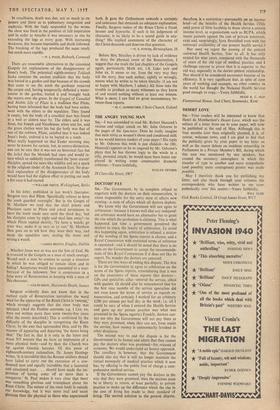DOCTORS' PAY
SIR,—The Government, by its complete refusal to negotiate with the doctors on their remuneration, is alone responsible for the sorry state of affairs now existing—a state of affairs which all doctors deplore.
We know why the Government will not agree to arbitration : because it knows well that any independ- ent arbitrator would have no alternative but to grant the rise which the profession is claiming. This is what happened last time a government permitted the doctors to enjoy the luxury of arbitration. To avoid this happening again, arbitration is refused, a section of the wording of the Spens reports is chosen, and a Royal Commission with restricted terms of reference is appointed—and it should be noted that there is no onus on the Government to accept the recommenda- tions of this Royal Commission if it does not like its report. No wonder the doctors are annoyed.
There are two ways of ending this dispute. The first is for the Government to agree to arbitration on the terms of the Spens reports, remembering that it was on the assurances of these reports that doctors— GPs and specialists alike—entered the service, albeit with qualms. (It should also be remembered that for the first nine months of the service specialists did not even know the terms of service as regards re- muneration, and certainly I worked for an arbitrary f200 per annum per half day in the week; i.e. all I could be sure of when I entered the Health Service and gave up my private practice was what was promised in the Spens reports.) Frankly, doctors can- not see why the Government will not pay them as they were promised, when they can see, from inside the service, how money is unnecessarily lavished in other directions. • The second way to end the dispute is for the Government to be honest and admit that they cannot pay the doctors what was promised—for reasons of economy. We would understand an honest approach. The corollary is, however, that the Government should also say that it will no longer maintain the virtual monopoly of medical practice which it now has, by offering to the public free of charge a com- prehensive medical service.
If the Government cannot pay the doctors in the way that they were promised, then the doctors must be at liberty to return, at least partially, to private practice to make up the difference which the rise in the cost of living has made to their standard of living. The second solution to the present dispute,
therefore, is a restriction—presumably on an income level—of the benefits of the Health Service. (This need prove of little hardship to those above a certain income level, as organisations such as BUPA, which insure patients against the cost of private treatment, exist and, surprisingly, have flourished even with the universal availability of our present health service.) Nor need we regret the passing of the present universal Health Service, 'free' to all. It has only existed for nine years, compared with the thousands of years of the old type of medical practice, and I challenge anyone to prove that it is superior to the old way, especially in the doctor-patient relationship_ Nor should it be considered sacrosanct because of its efficiency. It is very significant that, in spite of nine years of working and example, no other country in the world has thought the National Health Service good enough to copy.—Yours faithfully,










































 Previous page
Previous page